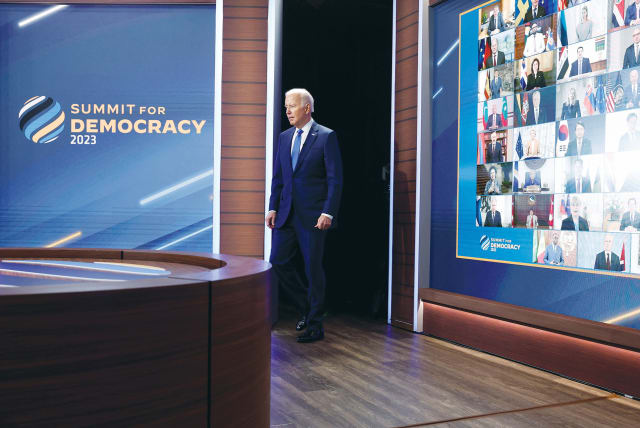Democracy and tyranny face off across the globe - opinion

The US and the Western world at large are attempting to depict the war in Ukraine as a struggle between good and evil, or a battle between democracy and tyranny.
In the midst of a cutthroat rivalry between world powers, and roughly a week before the conclusion of the Second International Forum on Democracy in Beijing, China and the US arranged the second Summit for Democracy. A number of nations, such as South Korea, Zambia, the Netherlands, and Costa Rica, chipped in to put together the summit. They conversed about tactics to fortify democratic systems, tackle graft, and safeguard human rights.
During the previous summit hosted by China, five main pillars were discussed which focused on democracy, sustainable development, innovation, global governance, diversity, and modernization. The two summits have brought to light a conflict between the US and China for global dominance, with democracy being at the center of this dispute. It has become a matter of the democratic governance model, core principles, and distinguishing features.
President Joe Biden is leading a crusade for what he calls “global democracy,” which he emphasized strongly during the first Summit for Democracy held in Washington in 2021, and even more fervently during his visit to Poland and Ukraine. He positioned himself as the leader of a worldwide campaign against “bad guys,” which he described as a “test for the ages,” referring to those who challenge the Western democratic model. This creates a new division of the world that resembles the model established by former president George W. Bush, who laid out the principle of “you are either with us or against us.”
The US and the Western world at large are attempting to depict the war in Ukraine as a struggle between good and evil, or a battle between democracy and tyranny.
During a trip to Warsaw, the US underscored that “The democracies of the world have grown stronger, not weaker, but the autocrats of the world have gotten weaker,” even though the conflict is chiefly a power struggle and domination tussle between Russia and NATO.
The US democracy summit was attended by approximately 120 nations, whereas China’s summit had about 100 participating countries, indicating the evident worldwide split between the two dominant powers.
In truth, during the most recent summit, President Biden declared his country’s dedication to allocate $690 million to reinforce democracy programs worldwide, promoting the slogan of “technology for democracy,” which is a substantial funding amount that the US has not previously given in the face of humanitarian crises affecting numerous regions of the globe.
THE CONCEPT of division founded on ideology or political beliefs is an idea that originates from the Cold War era and is in complete opposition to other concepts endorsed by the US itself in the post-Soviet era, such as globalization, free trade, and other methods focused on removing inflexible barriers and divisions.
President Biden used the election catchphrase of advocating for democracy and combating dictatorship during his first presidential campaign. It’s not by chance that the second summit on the same subject is taking place as he nears his bid for a second term as president.
Using every resource possible in the United States
It seems evident that the US is utilizing all of its soft power assets, which it has relied on to build its worldwide sway in recent decades, in response to what it perceives as the swift ascension of authoritarian regimes across the globe. By that, it is referring to China and Russia.
This American strategy may not serve the best interests of Washington, not only because the notion of protecting democracy is feeble and fracturing in the present international context, but also because the US only prioritizes this concept when it corresponds to its strategic objectives. Aside from that, American foreign policy places absolute importance on security, economic, and military interests, and there are numerous instances that validate this.
Furthermore, this divide exacerbates the fractures between the US and numerous strategic allies globally, particularly as meddling in the internal affairs of other countries, under the guise of safeguarding democracy, by means of supporting civil society, has emerged as one of the factors causing tension in Washington’s relationships with many nations.
One can highlight the stance of major democracies like India, who do not subscribe to the US and the West’s perspective of categorizing the events in Ukraine as a battle between democracy and oppression.
Biden considers the battle between democracy and tyranny as the make-or-break challenge of our era. This position sets the US at odds with nearly 70% of the world’s population who live under what Western research dubs authoritarian rule. Moreover, the US is grappling with internal splits and disparities resulting from democratic processes that have triggered turmoil, culminating in the January 6 insurrection at Capitol Hill in the aftermath of the last presidential elections.
The US has suffered a significant loss in its moral authority and global influence due to its failure to take a leading role in fighting the COVID-19 pandemic and leaving many countries to struggle on their own. In this context, it may not make sense to keep organizing democracy summits one after the other, particularly as some countries see China’s “authoritarian” approach as more supportive of developing nations during the pandemic. Moreover, the Chinese model of non-interference in other countries’ affairs is gaining popularity worldwide.
China asserts that its democratic governance model is tied to development and casts serious doubt on the capability and moral authority of Washington to impose its political ideology and way of life on other nations.
Researchers from Russia and China refer to public opinion polls conducted in the US, which reveal that over three-quarters of Americans are calling for significant political reforms in their country.
A Chinese newspaper, The Global Times, went so far as to say that the US needs more of a prescription for its own democracy than any other country due to the ongoing issues in American democracy, such as increasing crime rates, shootings, and a former president who refused to peacefully transfer power.
In reality, it has been proven that there is no one-size-fits-all model for political systems that can be implemented in all countries, regardless of the conflict of ideologies and models. Different forms of democracy exist, and the Western model is not the only option.
There are numerous studies in the West that argue that democracy is in crisis, particularly given the deep divisions that have emerged in the US. Furthermore, the idea of linking democracy to economic and developmental success has been debunked with the emergence of the Chinese model as a leading global economy.
Therefore, the ongoing power and influence struggle in the post-Ukraine phase could potentially lead to the emergence of a new political system or reinforce one of the existing ones.
The writer is a UAE political analyst and former Federal National Council candidate.
Jerusalem Post Store
`; document.getElementById("linkPremium").innerHTML = cont; var divWithLink = document.getElementById("premium-link"); if (divWithLink !== null && divWithLink !== 'undefined') { divWithLink.style.border = "solid 1px #cb0f3e"; divWithLink.style.textAlign = "center"; divWithLink.style.marginBottom = "15px"; divWithLink.style.marginTop = "15px"; divWithLink.style.width = "100%"; divWithLink.style.backgroundColor = "#122952"; divWithLink.style.color = "#ffffff"; divWithLink.style.lineHeight = "1.5"; } } (function (v, i) { });

